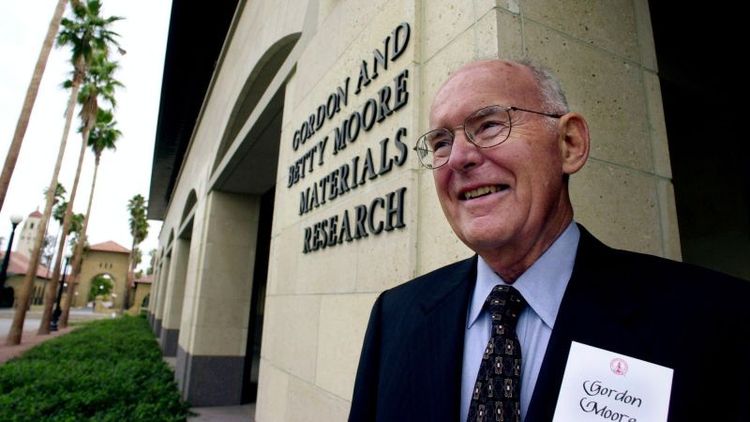Gordon Moore, Intel co-founder and creator of 'Moore's Law' that propelled the computer revolution, passes away at 94.

Gordon Moore, a co-founder of Intel, passed away at the age of 94. He was a pioneer in the semiconductor industry and famous for his prediction, known as "Moore's Law," that computing power would steadily increase over many years. The company announced his death on Friday.
Intel (INTC) and the charitable foundation of Moore's family announced that he passed away in the comfort of his home in Hawaii, with his loved ones by his side.
Moore, who co-founded Intel back in 1968, was a hands-on engineer in a group of prominent tech leaders. Together, they were responsible for placing "Intel Inside" processors in over 80% of all personal computers worldwide.
In a piece of writing from 1965, Moore noted that due to advances in technology, the quantity of transistors on microchips had approximately increased twofold every year since the creation of integrated circuits a short time before.
He made a forecast that the pattern would persist and it was labeled as "Moore's Law". Eventually, it was altered to every two years and this prompted Intel and other competing chip manufacturers to vigorously focus their efforts on research and development so that the general principle would remain accurate.
Moore once stated in his written work that when integrated circuits become more advanced, they will pave the way for amazing creations like household computers - or perhaps just computer-linked devices - self-regulating systems for cars, and handheld communication gadgets. This was written 20 years prior to the personal computer movement and over 40 years before the iPhone was introduced by Apple.
Following Moore's publication, the advancement of chips saw a considerable enhancement in both efficiency and affordability. This development has significantly contributed to the technological advancements of the world for over 50 years and has paved the way for personal computers, internet-based technology, and big players in the industry including Apple, Facebook, and Google.
Moore mentioned in an interview circa 2005 that being in the correct spot at the appropriate moment is pleasant. He also stated that he was lucky enough to enter the semiconductor sector when it was just beginning. Additionally, he had the possibility to develop from the period when a solitary silicon transistor was not achievable to a time when 1.7 billion of them could be placed on one chip. The ride has been incredible, according to him.
Over the past few years, companies such as Nvidia (NVDA) have argued that Moore's Law is no longer true because advancements in chip production have been slower.
However, even though Intel encountered manufacturing obstacles in recent times, which led to a decline in its market share, CEO Pat Gelsinger stated that he still believes in the validity of Moore's Law. The company is investing huge amounts of money in an attempt to achieve a transformation.
Despite foreseeing the rise of the personal computer trend, Moore confessed to Forbes magazine that he didn't acquire a home computer for himself until the latter part of the 1980s.
Moore, who originally hails from San Francisco, obtained a doctoral degree in both chemistry and physics from the California Institute of Technology in 1954.
He began his employment journey at the Shockley Semiconductor Laboratory where he encountered Robert Noyce, who would later become his business partner in Intel. Together with six others, they left Shockley in 1957 and started their own venture, Fairchild Semiconductor. Later on, in 1968, Moore and Noyce left Fairchild and founded Intel, a company specializing in memory chips, and named it after Integrated Electronics.
The initial employee selected by Moore and Noyce was Andy Grove, who had worked with them previously at Fairchild. Grove then went on to hold a leading role at Intel during the company's significant expansion in the periods of 1980s as well as 1990s.
In an interview with Fortune magazine, Moore referred to himself as an unexpected business owner who didn't have a strong desire to initiate a corporation. Despite this, Moore, Noyce, and Grove combined their talents and created an influential and dynamic team.
Noyce proposed some ideas to tackle the chip engineering issues, but Moore was the one who put in a lot of hard work by adjusting transistors and polishing Noyce's concept, which frequently yielded positive results. Grove completed the team by serving as Intel's specialist in operations and management.
Moore's evident skill motivated his co-workers and with the guidance of Moore and Noyce, Intel produced the microprocessors that revolutionized the personal computer industry.
Until 1975, he held the position of executive president, even though he and CEO Noyce considered themselves to be on equal footing. Following this, he served as chairman and CEO from 1979 to 1987 and continued as chairman until 1997.
Forbes magazine came up with an estimation that stated his present net worth as $7.2 billion in the year 2023.
For many years, Moore spent his time fishing and traveling around the world. His love for fishing was something that he enjoyed quite a bit. Along with his wife, Betty, he started a foundation that put its focus on environmental causes in 2000. The foundation was involved in a range of projects, including protecting the Amazon River basin and salmon streams in the United States, Canada, and Russia. Moore donated approximately $5 billion worth of Intel stock to fund the foundation's work.
He donated a substantial amount of money to his former school, the California Institute of Technology, to ensure that it remains a leading institution in the fields of technology and science. Additionally, he supported the SETI project, which aims to find evidence of intelligent life beyond Earth.
In 2002, President George W. Bush awarded Moore with the Medal of Freedom, which is the most esteemed civilian accolade in the nation. He and his spouse were blessed with a pair of kids.























































